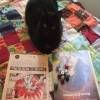Post by tavis on Sept 22, 2008 18:51:58 GMT -6
I'm reading the account of the disappearance of James Dallas Egbert III, who was famously supposed to have vanished in the steam tunnels under Michigan State University in August of 1979. Wikipedia has a good summary of the facts of the case, but the book is nevertheless fascinating reading.
The author is the private eye who was hired by Egbert's parents. You can get a sense of his self-image from his pose the photo on his website - the book has a picture of him posing for People Magazine in front of his house in Dallas, looking even more like one of the private dicks from the film-within-a-film in Boogie Nights. He likes to mention previous cases in which he faced down armed murderers; he brags about having superior equipment than the police, like a private plane that they use for surveillance. (Seeing the shape of the campus's physical plant from the air is what gives him the idea that it is the shape outlined with thumbtacks on the corkboard found in Egbert's dorm room.)
So the fun of the book is that you have a guy who is clearly psyched to have been referred to as "the real James Bond" trying to follow leads that start from late-70s college life, where he's already a fish out of water, and go into a successively stranger series of subcultures - the drug scene, the local gay community, SF conventions, and finally Dungeons and Dragons. Dear didn't write this account until 1984, so a little triangulation is necessary to use it as a window on the period, but I'm still finding it very interesting to see how he and his readership viewed things.
Of most interest to old-schoolers is the description of a D&D game that Dear played in. Earlier in the investigation, he bought and read through the LBB's looking for insight into Egbert's character (he liked to play magic-users). After hearing that Egbert had sought to impress his fellow students by "trestling" - lying on a train track or hanging from a bridge while a train goes overhead - Dear does this too so that he can understand the kid's thought processes. He then wants to actually play D&D to better empathize with Egbert. So he calls up a local hobby store and asks for a dungeon master. They give him the number of a local college student, and Dear calls him up. Here's his account of the conversation:
"I'll pay you fifty dollars if you'll play a game of Dungeons & Dragons with me. I want you to know I've read the books, but I've never played before. I want to play this afternoon."
"I've got a date this afternoon."
"This is more important."
"Fifty dollars?"
"Sixty if the game is a good one."
"I'd have to bring along a friend. The game is better if there's more than just one player."
"I'll see you at two o'clock. Red Roof Inn, Room 211."
The next 22 pages narrate Dear rolling up and equipping a third-level magic user, who sets out for an adventure with the DM's friend's second-level fighter/thief. Not being that well-versed in the Greyhawk supplement, it's hard for me to tell whether this multiclassing means they were using the AD&D books or not; Dear's earlier description clearly refers to booklets, and he doesn't mention using different equipment for this game.
Here are some of the highlights:
- They start out in town. The DM mentions some people are walking by with a box, and Dear's M-U, Tor, decides to steal it - out of character for an ex-cop, perhaps, but fully in line with the impulsiveness of first-time players!
- The town guards chase them into a tavern, where the fighter-thief has previously discovered the entrance to a tunnel. This immediate transition from bar to dungeon is an awesome bit of gaming efficiency! The inn of the Yawning Portal does the same for the Undermountain dungeon, but as you'd expect for the Forgotten Realms, there it's rationalized into a coherent history. Here it's just pure mystic underworld.
- Dear gets pissy because the fighter-thief steals three gold from him! The interaction between the PCs is totally dysfunctional until Tor casts a charm person spell. In writing this chapter, Dear blurs the lines between himself and his PC for literary effect to make a point about what he sees as the seductive immersiveness of the game. Because of that, it's hard to tell what's really going on at the table with the charm. At first it's clear the DM has the other player roll his save in a way that keeps him from twigging to what it's for. But then the interaction between the PCs turns saccharine sweet, which implies that the other player must have been aware of the spell in order to roleplay it. During the session, the charm wears off, which Dear detects because the other PC starts acting surly and sarcastic - again suggesting that the DM must have instructed the player on the spell's effect.
The author is the private eye who was hired by Egbert's parents. You can get a sense of his self-image from his pose the photo on his website - the book has a picture of him posing for People Magazine in front of his house in Dallas, looking even more like one of the private dicks from the film-within-a-film in Boogie Nights. He likes to mention previous cases in which he faced down armed murderers; he brags about having superior equipment than the police, like a private plane that they use for surveillance. (Seeing the shape of the campus's physical plant from the air is what gives him the idea that it is the shape outlined with thumbtacks on the corkboard found in Egbert's dorm room.)
So the fun of the book is that you have a guy who is clearly psyched to have been referred to as "the real James Bond" trying to follow leads that start from late-70s college life, where he's already a fish out of water, and go into a successively stranger series of subcultures - the drug scene, the local gay community, SF conventions, and finally Dungeons and Dragons. Dear didn't write this account until 1984, so a little triangulation is necessary to use it as a window on the period, but I'm still finding it very interesting to see how he and his readership viewed things.
Of most interest to old-schoolers is the description of a D&D game that Dear played in. Earlier in the investigation, he bought and read through the LBB's looking for insight into Egbert's character (he liked to play magic-users). After hearing that Egbert had sought to impress his fellow students by "trestling" - lying on a train track or hanging from a bridge while a train goes overhead - Dear does this too so that he can understand the kid's thought processes. He then wants to actually play D&D to better empathize with Egbert. So he calls up a local hobby store and asks for a dungeon master. They give him the number of a local college student, and Dear calls him up. Here's his account of the conversation:
"I'll pay you fifty dollars if you'll play a game of Dungeons & Dragons with me. I want you to know I've read the books, but I've never played before. I want to play this afternoon."
"I've got a date this afternoon."
"This is more important."
"Fifty dollars?"
"Sixty if the game is a good one."
"I'd have to bring along a friend. The game is better if there's more than just one player."
"I'll see you at two o'clock. Red Roof Inn, Room 211."
The next 22 pages narrate Dear rolling up and equipping a third-level magic user, who sets out for an adventure with the DM's friend's second-level fighter/thief. Not being that well-versed in the Greyhawk supplement, it's hard for me to tell whether this multiclassing means they were using the AD&D books or not; Dear's earlier description clearly refers to booklets, and he doesn't mention using different equipment for this game.
Here are some of the highlights:
- They start out in town. The DM mentions some people are walking by with a box, and Dear's M-U, Tor, decides to steal it - out of character for an ex-cop, perhaps, but fully in line with the impulsiveness of first-time players!
- The town guards chase them into a tavern, where the fighter-thief has previously discovered the entrance to a tunnel. This immediate transition from bar to dungeon is an awesome bit of gaming efficiency! The inn of the Yawning Portal does the same for the Undermountain dungeon, but as you'd expect for the Forgotten Realms, there it's rationalized into a coherent history. Here it's just pure mystic underworld.
- Dear gets pissy because the fighter-thief steals three gold from him! The interaction between the PCs is totally dysfunctional until Tor casts a charm person spell. In writing this chapter, Dear blurs the lines between himself and his PC for literary effect to make a point about what he sees as the seductive immersiveness of the game. Because of that, it's hard to tell what's really going on at the table with the charm. At first it's clear the DM has the other player roll his save in a way that keeps him from twigging to what it's for. But then the interaction between the PCs turns saccharine sweet, which implies that the other player must have been aware of the spell in order to roleplay it. During the session, the charm wears off, which Dear detects because the other PC starts acting surly and sarcastic - again suggesting that the DM must have instructed the player on the spell's effect.







